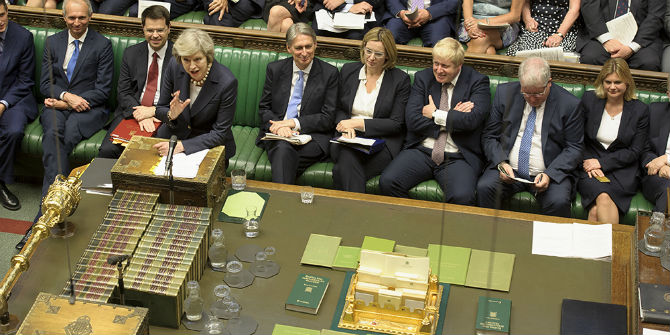 Theresa May has made much of her announcement that the European Communities Act will be repealed. But Mark Elliott argues that as well as being legally unnecessary it will probably give Parliament less – rather than more – say over legislation post-Brexit, as ministers are likely to repeal or amend EU laws via executive order. It also suggests May is unwilling to tolerate the devolved legislatures getting in the way of her plans. But if the Supreme Court rules Parliament must debate Article 50, her plans will have to change.
Theresa May has made much of her announcement that the European Communities Act will be repealed. But Mark Elliott argues that as well as being legally unnecessary it will probably give Parliament less – rather than more – say over legislation post-Brexit, as ministers are likely to repeal or amend EU laws via executive order. It also suggests May is unwilling to tolerate the devolved legislatures getting in the way of her plans. But if the Supreme Court rules Parliament must debate Article 50, her plans will have to change.
“Brexit means Brexit” was only ever going to cut it for so long. And although, in her first speech to a Conservative Party conference as Prime Minister, Theresa May has repeated that well-worn phrase, she has evidently come to the view that Eurosceptics — or Brexiteers, as we must now call then — now require more by way of red meat. Such nourishment was, on the face of it, supplied in abundance in May’s speech — by way not only of the announcement that the Government plans to trigger the Article 50 withdrawal process by the end of March 2017, but also by means of signalling that the next Queen’s Speech will include a “Great Repeal Bill”. Since the primary object of the proposed “great repeal” is the European Communities Act 1972 (ECA) itself — the bête noire of the Europhobic right — the announcement of the new Bill is undoubtedly a clever piece of political theatre, the aim being to satisfy those who have grown weary, not to say sceptical, of May’s tautological mantra. But does the announcement of the Great Repeal Bill amount to anything more than this?

Announcing the repeal of the ECA is doubtless a sensible tactical move by the Prime Minister given the demands she faces from her right-wing. The ECA gives not only effect to EU law in the UK, but also priority to EU law over UK law — including over Acts of Parliament. Focussing on the proposal to repeal the ECA fits very neatly with the narrative developed by the Prime Minister in her speech about making the UK a “fully-independent, sovereign country”. Or, as David Davis put it in his speech to the Conservative Party conference, repealing the ECA will deliver “what people voted for: power and authority residing once again with the sovereign institutions of our own country”.
There are, however, two caveats that make the announcement of the ECA’s repeal far less legally significant than might at first be assumed. On the one hand, although the Great Repeal Act (as it will by then have become) will be on the statute book before Brexit day, it will not take effect and repeal the ECA until Brexit day. This announcement does not, therefore, amount to the sort of immediate, shock-and-awe ECA repeal that was floated by some on Brexit’s extreme fringes. That was a suggestion that was never likely to be implemented, given that it would have placed the UK in breach of its EU Treaty obligations pre-Brexit. On the other hand, however, repealing the ECA upon Brexit is hardly a big deal. Indeed, a natural assumption would be that the ECA would inevitably be repealed upon Brexit, given that it would make no sense, after leaving the EU, to retain legislation providing for EU law’s effect and priority in the UK. However, we can in fact go further and say that repealing the ECA post-Brexit is legally unnecessary, and will in fact amount to nothing more than a tidying-up exercise. That is so because the ECA only gives effect and priority to such EU laws as are, at any given point in time, binding upon the UK thanks to its EU Treaty obligations. Post-Brexit, the UK will have no such obligations, and the ECA will therefore give effect and priority to no EU law whatever.
Although the Great Repeal Bill will repeal the ECA, paradoxically it will not repeal — in the sense of getting rid of — any EU law. That is because the Government has — sensibly and inevitably — concluded that the vast body of EU law cannot simply be made to vanish overnight. The chaos that would ensue if it did would be profound. Against that background, the Great Repeal Bill, far from getting rid of EU law from the UK legal system, will preserve it. The intention appears to be that a snapshot of the EU laws applicable in the UK will be taken at one minute to midnight on Brexit eve, and that those laws will — by the statutory magic of the Great Repeal Bill — be transformed into UK laws at the clock strikes midnight on Brexit day. There will then be a leisurely — not to mention Sisyphean — process whereby the enormous body of domesticated EU legislation will be sifted, and decisions taken as to which aspects of (what was) EU law are to be retained, to be amended, and to be excised from UK law altogether.
There is very little detail so far on how that process will be undertaken. But there is every prospect that through its Great Repeal Bill the Government will seek to get Parliament to confer upon Ministers substantial powers to carry out that process themselves. The Prime Minister said in her speech that “[a]ny changes in the law will have to be subject to full scrutiny and proper Parliamentary debate”. However, it is almost inconceivable that the entirety of the process whereby the body of domesticated EU law is to be reviewed — and some, perhaps much, of it adjusted or removed — could be carried out in this way. The strong likelihood is that the process will be carried on largely by executive means, through the insertion into the Great Repeal Bill of wide-ranging powers enabling Ministers, rather than Parliament, to repeal or amend domesticated EU legislation. That, of course, would pile irony upon irony, as a Government determined to restore parliamentary sovereignty while giving Parliament no say over the triggering of Article 50 moved seamlessly into a vast accumulation of executive law-making power that would marginalise Parliament’s role in shaping the post-Brexit legislative landscape.
That the new Government sees little role for Parliament in this crucial area is underlined by other aspects of the speeches given in Birmingham on Sunday. The Prime Minister, for instance, suggested that those arguing that Parliament should have a say in triggering Article 50 “are not standing up for democracy, they’re trying to subvert it”. She also pointedly said that “the negotiations between the United Kingdom and the European Union are the responsibility of the Government and nobody else”. The Brexit Secretary gave a similar glimpse of the marginal role that appears to be envisaged for Parliament, ruling out the prospect of a “running commentary” on negotiations. If that means that the Government is unwilling to keep Parliament fully informed, then Parliament’s capacity to hold the Government to account during the negotiation process will be decidedly limited. These positions sit in tension with the view recently expressed by the House of Lords Constitution Committee, which said that: “Parliament and the Government should, at this early stage, take the opportunity to establish their respective roles and how they will work together during the negotiation process.”
Finally, it is important to bear in mind the implications of what is emerging from the Conservative Party conference from the perspective of the UK’s territorial constitution. One of Theresa May’s first acts as Prime Minister was to travel to Scotland for talks with First Minister Nicola Sturgeon, the mood music being somewhat suggestive of a collaborative approach. That music has now been brought to an abrupt halt. Although “consultation” with devolved institutions was promised by the Prime Minister, she baldly asserted that “the job of negotiating our new relationship is the job of the [UK] Government”: “we voted in the referendum as one United Kingdom, we will negotiate as one United Kingdom, and we will leave the European Union as one United Kingdom”.
Against that background, the Prime Minister’s proposed sequencing is interesting. If all goes according to plan, Article 50 will be triggered by the UK Government under prerogative power before the end of March 2017. The Great Repeal Bill will then be introduced into Parliament later in 2017. Doing things in this order minimises the likelihood of devolved institutions derailing the plan, bearing in mind that the Great Repeal Bill will almost certainly require legislative consent motions to be passed by the devolved legislatures. Such motions will be needed — politically and constitutionally, albeit not as a matter of strict law — because the Great Repeal Bill will presumably address not just the repeal of the ECA but also the amendment of the devolution legislation, which presently forbids devolved bodies from breaching EU law. By constitutional convention, however, the UK Parliament does not normally legislate so as to adjust the scope of devolved authority without the devolved legislatures’ consent. There is, of course, a strong possibility that such consent would be withheld by the Scottish Parliament. But if, by the time such consent is requested, the Article 50 two-year clock is already running, the withholding of consent would be incapable of placing an insuperable obstacle in the way of Brexit. In such circumstances, domestic constitutional nicety would have to take a back-seat in the face of what would, by then, have become the inexorable reality of impending Brexit.
The overarching message that has emerged from the speeches at the Conservative Party conference is that the Government is single-mindedly committed to an executive-led withdrawal process, and is unprepared to tolerate interference in that process by either Parliament or the devolved institutions. Of course, there is one institution — the UK Supreme Court — whose interference the Government may have to tolerate whether it likes it or not. By the end of this year, the Court is likely to have ruled on the question whether the Government has the power to trigger Article 50 without parliamentary authorisation. If the Court rules that Parliament must be involved, then the constitutional landscape envisioned in the Prime Minister’s speech will alter significantly, and the Government’s plans will have to be revisited accordingly. But if the Government is permitted to go ahead and trigger Article 50 without reference to Parliament, then the Prime Minister’s speech will have served to make the broad outline of what lies ahead — at least as far as the mechanics are concerned — a little clearer.
This post represents the views of the author and not those of the Brexit blog, nor the LSE. It first appeared at the Public Law for Everyone blog.
Mark Elliott is Professor of Public Law at the University of Cambridge and a Fellow of St Catharine’s College, Cambridge.







1 Comments